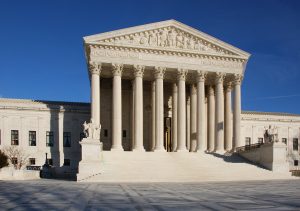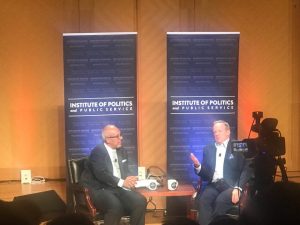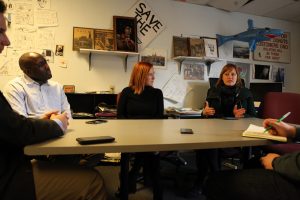The Georgetown University Institute of Politics and Public Service welcomed its new class of fellows to Georgetown with the start of the spring semester. The five spring 2018 fellows have extensive and varied political experiences, backgrounds in different industries, and views from both sides of the aisle. The Voice sat down with the fellows to discuss their goals for the semester and what they hope to take away from their semester on the Hilltop.
The spring class includes Katie Walsh Shields, former White House deputy chief of staff under the Trump Administration; Steven Law, CEO and president of the Republican fundraising committee Senate Leadership Fund and political consulting firm American Crossroads, Dorothy McAuliffe, the former first lady of Virginia, Eugene Scott, political reporter for The Washington Post’s “The Fix”, and Nadeam Elshami, former chief of staff to Nancy Pelosi.
Each semester, the fellows lead weekly discussion groups on various topics, hold office hours, and work with a student strategy team, a small group of students assigned to each fellow, to brainstorm and develop solutions to the political problems the fellow focuses on. Law, whose discussion section is named “Democracy and its Discontents” said he is excited for the opportunity to share his real-life experiences with students at Georgetown, but also learn from the students themselves.
“[These discussions are] a tremendous opportunity I think for students to test their own views and theories against people who may have a more seasoned view of things,” said Law. “But at the same time… we look forward to getting a fresh perspective as well. I mean, we certainly have no where near a monopoly on all the world’s wisdom on politics and government and problems that need to be solved.”
The other fellows shared similar hopes of learning from students. McAuliffe, who is leading the discussion “Revitalizing American Democracy Through Public Service,” said she is looking forward to exploring how to engage the next generation in public service as well as the importance of participation in local government. Elshami noted the two-way component of the weekly sessions in terms of connecting generations of seasoned political players with students looking to enter government when they graduate.
“We’re talking about how things really work in Congress and what’s behind the scenes, and so on,” said Elshami. “But at the end of the day, the students are going to provide us, I hope, with concrete suggestions on how we can make the system better.”
According to Walsh Shields, a crucial aspect of those future improvements is bipartisanship in all levels of government. She encouraged students to engage with fellows of different political backgrounds and views and to explore the different topics offered this spring.
“I think there’s been a break down, both in Congress and in our country, of the ability of people from two different sides to be able to come to a table and have a conversation,” said Walsh Shields. “If the student takes away from [the session] that they had an engaging and enriching experience having a conversation about an issue where they learned more, then I think that’s all we can ask them to take away from it.”
Scott, whose session focuses on “Identity Politics in the Age of Trump,” continued on this theme, noting the importance encountering different perspectives. A familiarity with the issues affecting people outside the Washington bubble could fundamentally impact how people approach policy making, he said.
“If there’s anything I can help challenge students on, it’s… figuring out a way to talk about people outside of their tribe, in a way that respects them as human beings and includes a level of knowledge and facts and insights that a lot of the conversations don’t have right now,” Scott said.
The Voice asked the fellows to revisit the Monday before the 2016 presidential election, right before the victory of President Donald Trump shocked many in the political sphere: “If you could go back to the night before the election, what would you tell yourself?”
The fellows acknowledged that the unusually tense political climate students are living in is a new landscape for political experts as well. After they contemplated in silence, Scott said that the media could have engaged more with both Trump supporters and detractors in order to better understand the citizenry. Law agreed with Scott’s sentiment and noted that those living in D.C. needed to understand the capital city is a “self-referential, self-reinforcing bubble.”
Elshami gave his response in three words: “Elections have consequences.”
Picking up on Elshami’s comment, Walsh Fields explained that these consequences were both immediate and in the future.
“Democracy is a living, breathing entity,” she said.
McAuliffe garnered agreement around the table when she said she would tell herself to take a “deep breath and get a good night’s sleep.” The fellows agreed that it was not worth the lost sleep to wait until the early hours of the morning for the results of the election. McAuliffe also said that, despite the common alerts from media and pundits that the country is in a permanent state of partisan gridlock, there were examples of bipartisan teamwork across the country. She referenced Virginia, the state in which she was first lady until last year.
In terms of their semester on the Hilltop, the fellows said Georgetown students had a chance to influence the future of the country and they were excited to both teach and learn from those joining in their discussion sessions.
“If you are a student at Georgetown, you are going to be, by definition, a person of influence,” said Law. “And if you’re a student at Georgetown…you’ve had something invested in you which is of tremendous value. And one of the callings that every single student will exercise when they leave here, in one way or another, is being a citizen.”





